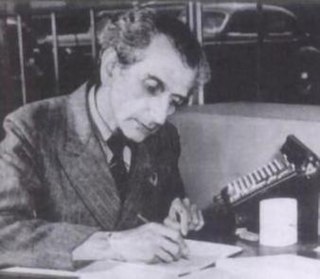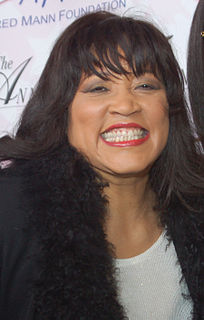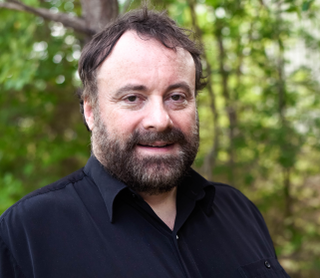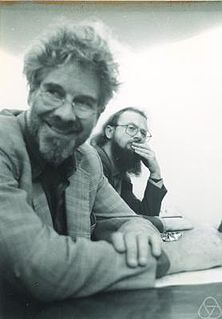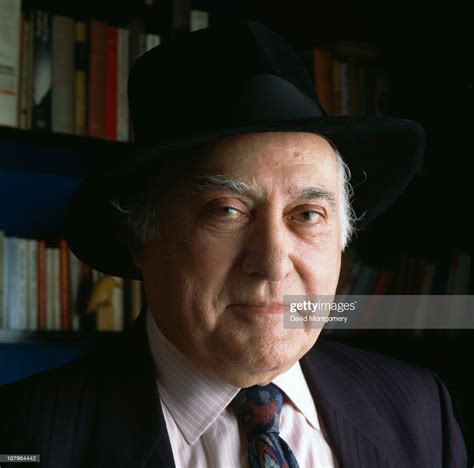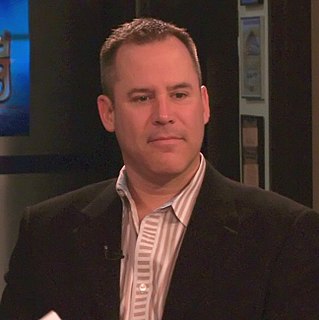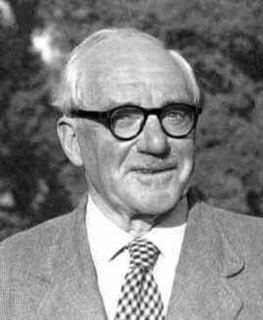Top 342 Mathematician Quotes & Sayings - Page 6
Explore popular Mathematician quotes.
Last updated on November 9, 2024.
The master-economist must possess a rare combination of gifts. He must reach a high standard in several different directions and must combine talents not often found together. He must be mathematician, historian, statesman, philosopher - in some degree. He must understand symbols and speak in words. He must contemplate the particular in terms of the general, and touch abstract and concrete in the same flight of thought. He must study the present in the light ofthe past for the purposes of the future
When the mathematician says that such and such a proposition is true of one thing, it may be interesting, and it is surely safe. But when he tries to extend his proposition to everything, though it is much more interesting, it is also much more dangerous. In the transition from one to all, from the specific to the general, mathematics has made its greatest progress, and suffered its most serious setbacks, of which the logical paradoxes constitute the most important part. For, if mathematics is to advance securely and confidently, it must first set its affairs in order at home.
Most of the arts, as painting, sculpture, and music, have emotional appeal to the general public. This is because these arts can be experienced by some one or more of our senses. Such is not true of the art of mathematics; this art can be appreciated only by mathematicians, and to become a mathematician requires a long period of intensive training. The community of mathematicians is similar to an imaginary community of musical composers whose only satisfaction is obtained by the interchange among themselves of the musical scores they compose.
The Advantage is that mathematics is a field in which one's blunders tend to show very clearly and can be corrected or erased with a stroke of the pencil. It is a field which has often been compared with chess, but differs from the latter in that it is only one's best moments that count and not one's worst. A single inattention may lose a chess game, whereas a single successful approach to a problem, among many which have been relegated to the wastebasket, will make a mathematician's reputation.
Thus, be it understood, to demonstrate a theorem, it is neither necessary nor even advantageous to know what it means. The geometer might be replaced by the "logic piano" imagined by Stanley Jevons; or, if you choose, a machine might be imagined where the assumptions were put in at one end, while the theorems came out at the other, like the legendary Chicago machine where the pigs go in alive and come out transformed into hams and sausages. No more than these machines need the mathematician know what he does.
I am genuinely sorry for scientists of the younger generation who never knew Fisher personally. So long as you avoided a handful of subjects like inverse probability that would turn Fisher in the briefest possible moment from extreme urbanity into a boiling cauldron of wrath, you got by with little worse than a thick head from the port which he, like the Cambridge mathematician J. E. Littlewood, loved to drink in the evening. And on the credit side you gained a cherished memory of English spoken in a Shakespearean style and delivered in the manner of a Spanish grandee.
I began to research the concept of dimensionality from the point of view of quality, and not just quantity, as a mathematician might do. Taking my clues from the theosophical use made of the Vedantic levels of reality, I identified the western notion of Energy (as someting which is effecatious by means of motion), with the idea of Time. The more comprehensive dimension 'eternity' I defined as a form of energy which is efficacious without motion. In this manner I began to establish the qualities of dimensions and open out the seemingly monolithic concept of energy.
However great a man's fear of life, suicide remains the courageous act, the clear-headed act of a mathematician. The suicide has judged by the laws of chance - so many odds against one that to live will be more miserable than to die. His sense of mathematics is greater than his sense of survival. But think how a sense of survival must clamor to be heard at the last moment, what excuses it must present of a totally unscientific nature.
Statistically, it would seem improbable that any mathematician or scientist, at the age of 66, would be able through continued research efforts, to add much to his or her previous achievements. However I am still making the effort and it is conceivable that with the gap period of about 25 years of partially deluded thinking providing a sort of vacation my situation may be atypical. Thus I have hopes of being able to achieve something of value through my current studies or with any new ideas that come in the future.
I like words and numbers. I'm obsessed with them. You know, I think I would've been a mathematician had I kept up, but it's the stuff in your head, you know? It's like being technologically adept. You have it or you don't. You can learn it, but some people just have it. They go to sleep, wake up, and know everything. I like games, too. I love playing games.
By analyzing data from Greenwich Observatory in the period 1836-1953, John A. Eddy [Harvard-Smithsonian Center for Astrophysics and High Altitude Observatory in Boulder] and Aram A. Boornazian [mathematician with S. Ross and Co. in Boston] have found evidence that the sun has been contracting about 0.1% per century during that time, corresponding to a shrinkage rate of about 5 feet per hour. And digging deep into historical records, Eddy has found 400-year-old eclipse observations that are consistent with such a shrinkage.
The concept of an independent system is a pure creation of the imagination. For no material system is or can ever be perfectly isolated from the rest of the world. Nevertheless it completes the mathematician's "blank form of a universe" without which his investigations are impossible. It enables him to introduce into his geometrical space, not only masses and configurations, but also physical structure and chemical composition. Just as Newton first conclusively showed that this is a world of masses, so Willard Gibbs first revealed it as a world of systems.
The scientist has to take 95 per cent of his subject on trust. He has to because he can't possibly do all the experiments, therefore he has to take on trust the experiments all his colleagues and predecessors have done. Whereas a mathematician doesn't have to take anything on trust. Any theorem that's proved, he doesn't believe it, really, until he goes through the proof himself, and therefore he knows his whole subject from scratch. He's absolutely 100 per cent certain of it. And that gives him an extraordinary conviction of certainty, and an arrogance that scientists don't have.
The future mathematician ... should solve problems, choose the problems which are in his line, meditate upon their solution, and invent new problems. By this means, and by all other means, he should endeavor to make his first important discovery: he should discover his likes and dislikes, his taste, his own line.
We have no knowledge, that is, no general principles drawn from the contemplation of particular facts, but what has been built up by pleasure, and exists in us by pleasure alone. The Man of Science, the Chemist and Mathematician, whatever difficulties and disgusts they may have had to struggle with, know and feel this. However painful may be the objects with which the Anatomist's knowledge is connected, he feels that his knowledge is pleasure; and where he has no pleasure he has no knowledge.
The first night Stephen and I slept together, he whispered numbers into my ear: long, high numbers -- distances between planets, seconds in a life. He spoke as if they were poetry, and they became poetry. Later, when he fell asleep, I leaned over him and watched, trying to picture a mathematician's dreams. I concluded that Stephen must dream in abstract, cool designs like Mondrian paintings.
A mathematician of the first rank, Laplace quickly revealed himself as only a mediocre administrator; from his first work we saw that we had been deceived. Laplace saw no question from its true point of view; he sought subtleties everywhere; had only doubtful ideas, and finally carried the spirit of the infinitely small into administration.
We know next to nothing with any certainty about Pythagoras, except that he was not really called Pythagoras. The name by which he is known to us was probably a nickname bestowed by his followers. According to one source, it meant ‘He who spoke truth like an oracle’. Rather than entrust his mathematical and philosophical ideas to paper, Pythagoras is said to have expounded them before large crowds. The world’s most famous mathematician was also its first rhetorician.
This Excellent Mathematician having given us, in the Transactions of February last, an account of the cause, which induced him to think upon Reflecting Telescopes, instead of Refracting ones, hath thereupon presented the curious world with an Essay of what may be performed by such Telescopes; by which it is found, that Telescopical Tubes may be considerably shortened without prejudice to their magnifiying effect. On his invention of the catadioptrical telescope, as he communicated to the Royal Society.
The question you raise, 'How can such a formulation lead to computations?' doesn't bother me in the least! Throughout my whole life as a mathematician, the possibility of making explicit, elegant computations has always come out by itself, as a byproduct of a thorough conceptual understanding of what was going on. Thus I never bothered about whether what would come out would be suitable for this or that, but just tried to understand - and it always turned out that understanding was all that mattered.
An axiomatic system comprises axioms and theorems and requires a certain amount of hand-eye coordination before it works. A formal system comprises an explicit list of symbols, an explicit set of rules governing their cohabitation, an explicit list of axioms, and, above all, an explicit list of rules explicitly governing the steps that the mathematician may take in going from assumptions to conclusions. No appeal to meaning nor to intuition. Symbols lose their referential powers; inferences become mechanical.
I hope that no one present will suspect me of offering my personal criticism of the Western system to present socialism as an alternative. Having experienced applied socialism in a country where the alternative has been realized, I certainly will not speak for it. The well-known Soviet mathematician Shafarevich, a member of the Soviet Academy of Science, has written a brilliant book under the title Socialism; it is a profound analysis showing that socialism of any type and shade leads to a total destruction of the human spirit and to a leveling of mankind into death.
Ohm (a distinguished mathematician, be it noted) brought into order a host of puzzling facts connecting electromotive force and electric current in conductors, which all previous electricians had only succeeded in loosely binding together qualitatively under some rather vague statements. Even as late as 20 years ago, "quantity" and "tension" were much used by men who did not fully appreciate Ohm's law.
Man is full of desires: he loves only those who can satisfy them all. "This man is a good mathematician," someone will say. But I have no concern for mathematics; he would take me for a proposition. "That one is a good soldier." He would take me for a besieged town. I need, that is to say, a decent man who can accommodate himself to all my desires in a general sort of way.
The most spectacular thing about Johnny [von Neumann] was not his power as a mathematician, which was great, or his insight and his clarity, but his rapidity; he was very, very fast. And like the modern computer, which no longer bothers to retrieve the logarithm of 11 from its memory (but, instead, computes the logarithm of 11 each time it is needed), Johnny didn't bother to remember things. He computed them. You asked him a question, and if he didn't know the answer, he thought for three seconds and would produce and answer.
As a young boy, Charles Darwin made friends easily but preferred to spend his time taking long, solitary nature walks. (As an adult he was no different. “My dear Mr. Babbage,” he wrote to the famous mathematician who had invited him to a dinner party, “I am very much obliged to you for sending me cards for your parties, but I am afraid of accepting them, for I should meet some people there, to whom I have sworn by all the saints in Heaven, I never go out.”)
My favourite fellow of the Royal Society is the Reverend Thomas Bayes, an obscure 18th-century Kent clergyman and a brilliant mathematician who devised a complex equation known as the Bayes theorem, which can be used to work out probability distributions. It had no practical application in his lifetime, but today, thanks to computers, is routinely used in the modelling of climate change, astrophysics and stock-market analysis.
Had you or I been born at the Bay of Soldania, possibly our Thoughts, and Notions, had not exceeded those brutish ones of the Hotentots that inhabit there: And had the Virginia King Apochancana, been educated in England, he had, perhaps been as knowing a Divine, and as good a Mathematician as any in it. The difference between him, and a more improved English-man, lying barely in this, That the exercise of his Facilities was bounded within the Ways, Modes, and Notions of his own Country, and never directed to any other or farther Enquiries.
I myself, a professional mathematician, on re-reading my own work find it strains my mental powers to recall to mind from the figures the meanings of the demonstrations, meanings which I myself originally put into the figures and the text from my mind. But when I attempt to remedy the obscurity of the material by putting in extra words, I see myself falling into the opposite fault of becoming chatty in something mathematical.
Then he is a monster!" the Prince crowed, "and I must slay him at once. The Formula works!" "Your Formula must result in a great deal of fighting," I mused. "Oh, yes, when applied correctly mighty and noble battles result! Of course I always win—the value of Prince X is a constant. It cannot be lesser than that of Monster Y—this is the Moral Superiority Hypothesis made famous five hundred years ago by my ancestor Ethelred, the Mathematician-King. We have never seen his equal, in all these centuries.
And when I go around and talk to schools, what I tell the kids are, first of all, you have to accept each other's differences. Some of you are going to be a crappy football player, some of you are going to be a great mathematician. Whatever it is, accept each other's differences and help prop each other up.
If you ask ... the man in the street ... the human significance of mathematics, the answer of the world will be, that mathematics has given mankind a metrical and computatory art essential to the effective conduct of daily life, that mathematics admits of countless applications in engineering and the natural sciences, and finally that mathematics is a most excellent instrumentality for giving mental discipline... [A mathematician will add] that mathematics is the exact science, the science of exact thought or of rigorous thinking.
As far as I know, Clifford Pickover is the first mathematician to write a book about areas where math and theology overlap. Are there mathematical proofs of God? Who are the great mathematicians who believed in a deity? Does numerology lead anywhere when applied to sacred literature? Pickover covers these and many other off-trail topics with his usual verve, humor, and clarity. And along the way the reader will learn a great deal of serious mathematics.
We come finally, however, to the relation of the ideal theory to real world, or "real" probability. If he is consistent a man of the mathematical school washes his hands of applications. To someone who wants them he would say that the ideal system runs parallel to the usual theory: "If this is what you want, try it: it is not my business to justify application of the system; that can only be done by philosophizing; I am a mathematician". In practice he is apt to say: "try this; if it works that will justify it".
We academic scientists move within a certain sphere, we can go on being useless up to a point, in the confidence that sooner or later some use will be found for our studies. The mathematician, of course, prides himself on being totally useless, but usually turns out to be the most useful of the lot. He finds the solution but he is not interested in what the problem is: sooner or later, someone will find the problem to which his solution is the answer.
The mathematician may be compared to a designer of garments, who is utterly oblivious of the creatures whom his garments may fit. To be sure, his art originated in the necessity for clothing such creatures, but this was long ago; to this day a shape will occasionally appear which will fit into the garment as if the garment had been made for it. Then there is no end of surprise and delight.
Let me tell you how at one time the famous mathematician Euclid became a physician. It was during a vacation, which I spent in Prague as I most always did, when I was attacked by an illness never before experienced, which manifested itself in chilliness and painful weariness of the whole body. In order to ease my condition I took up Euclid's Elements and read for the first time his doctrine of ratio, which I found treated there in a manner entirely new to me. The ingenuity displayed in Euclid's presentation filled me with such vivid pleasure, that forthwith I felt as well as ever.
Wormholes were first introduced to the public over a century ago in a book written by an Oxford mathematician. Perhaps realizing that adults might frown on the idea of multiply connected spaces, he wrote the book under a pseudonym and wrote it for children. His name was Charles Dodgson, his pseudonym was Lewis Carroll, and the book was Through The Looking Glass.
I do believe in simplicity. It is astonishing as well as sad, how many trivial affairs even the wisest thinks he must attend to in a day; how singular an affair he thinks he must omit. When the mathematician would solve a difficult problem, he first frees the equation of all incumbrances, and reduces it to its simplest terms. So simplify the problem of life, distinguish the necessary and the real. Probe the earth to see where your main roots run.
The last level of metaphor in the Alice books is this: that life, viewed rationally and without illusion, appears to be a nonsense tale told by an idiot mathematician. At the heart of things science finds only a mad, never-ending quadrille of Mock Turtle Waves and Gryphon Particles. For a moment the waves and particles dance in grotesque, inconceivably complex patterns capable of reflecting on their own absurdity.
Nobody is publicly accepted as an expert on poetry unless he displays the sign of poet, mathematician, etc., but universal men want no sign and make hardly any distinction between the crafts of poet and embroiderer. Universal men are not called poets or mathematicians, etc. But they are all these things and judges of them too. No one could guess what they are, and they will talk about whatever was being talked about when they came in. One quality is not more noticeable in them than another, unless it becomes necessary to put it into practice, and then we remember it.


